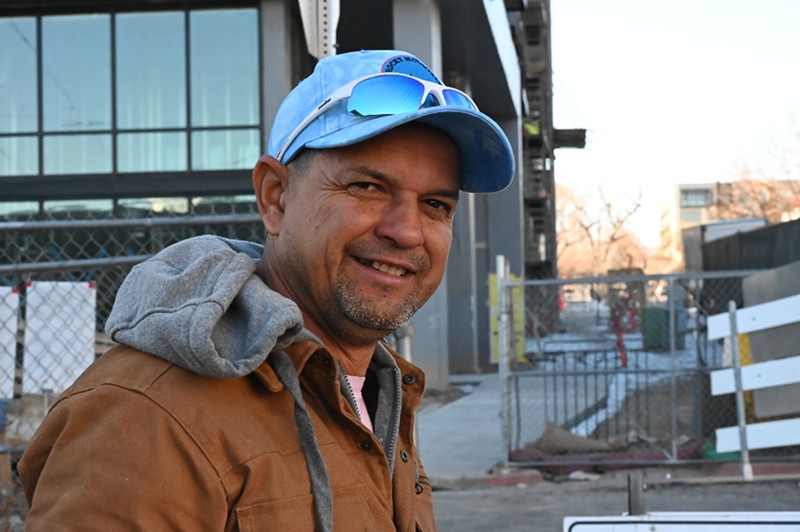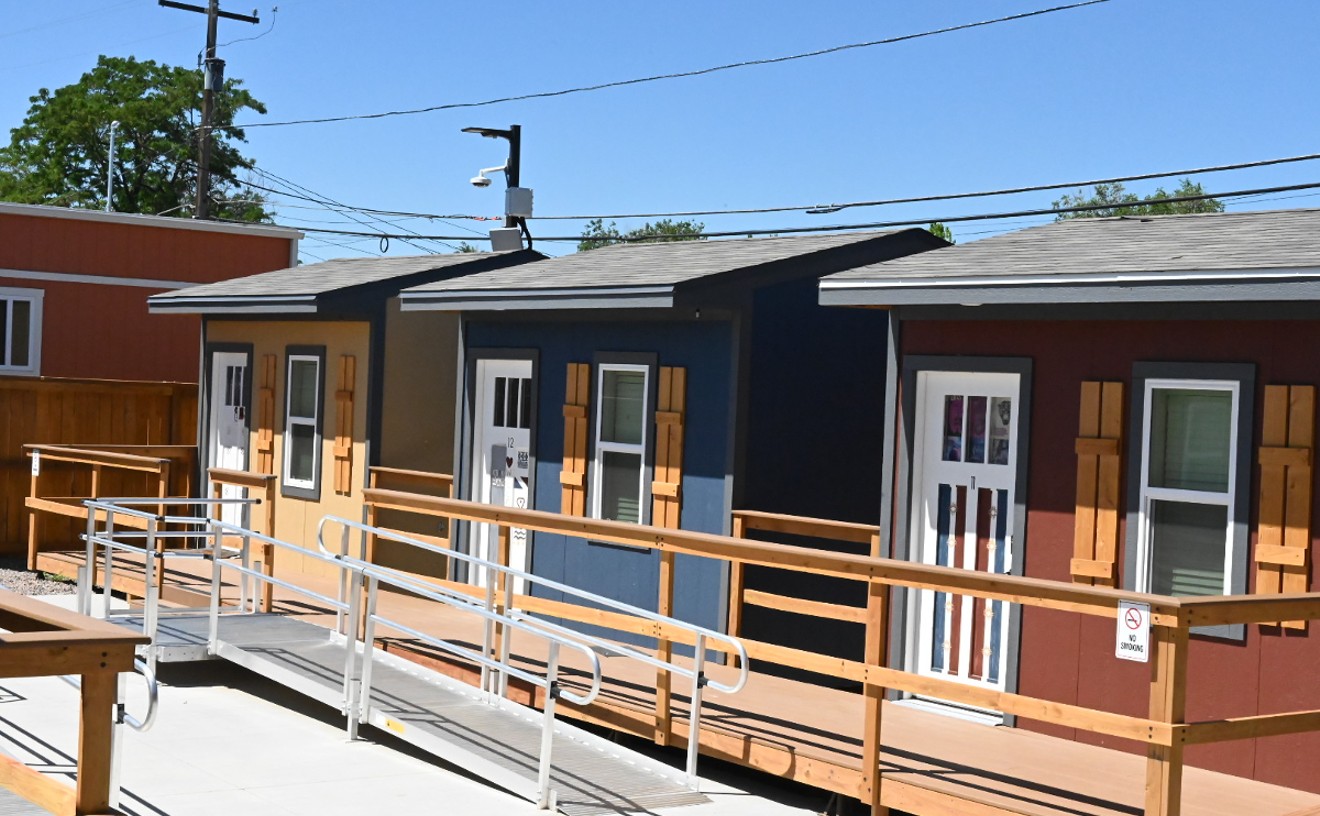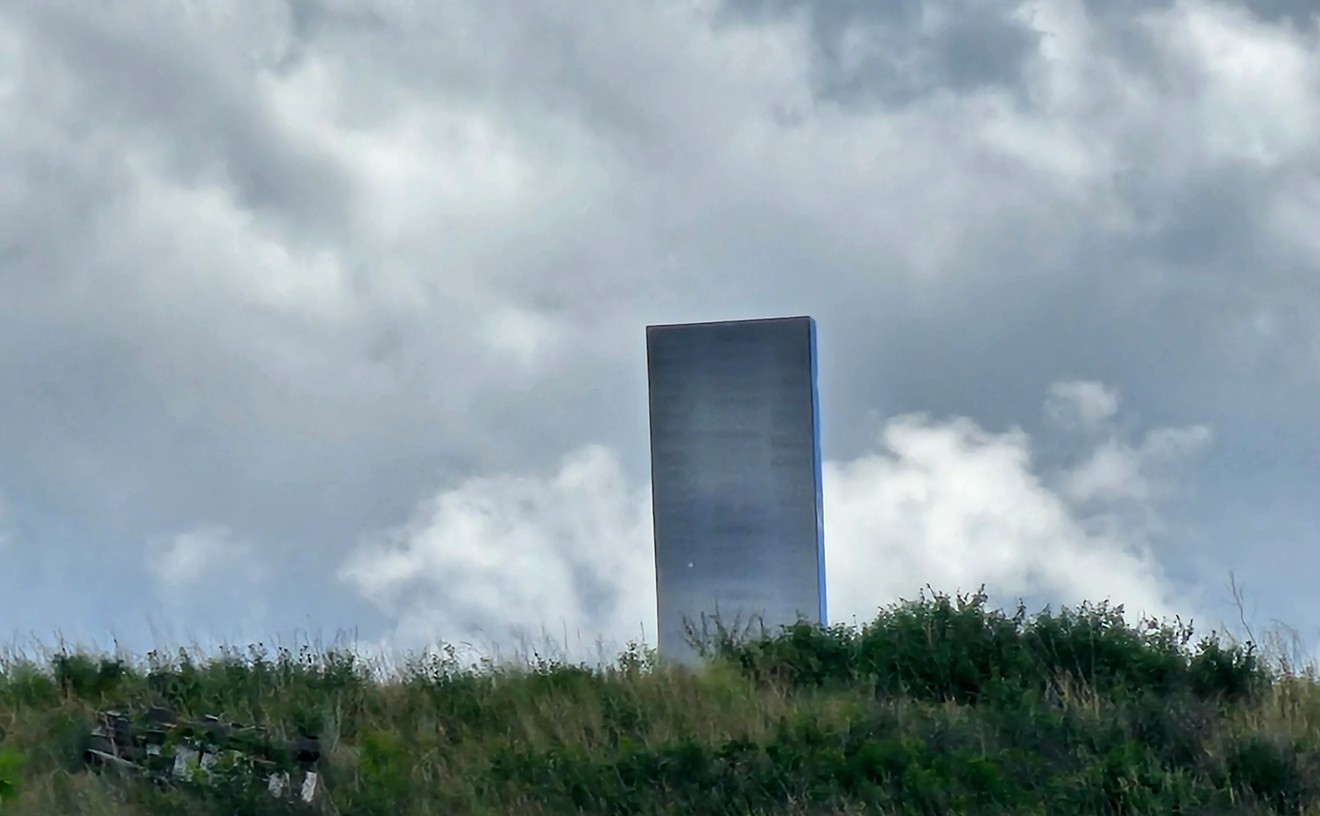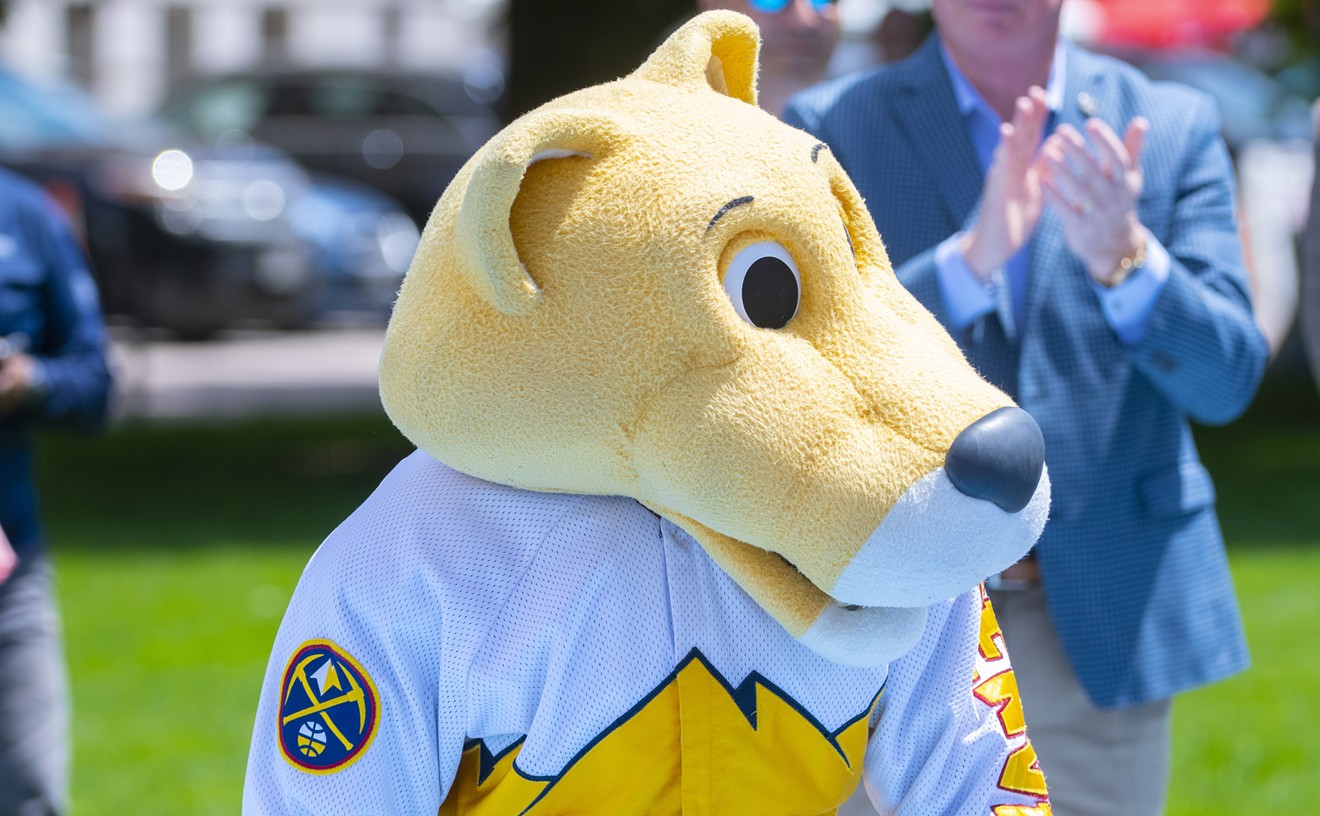"I searched for Mississippi, Dallas, Miami. I always enjoyed it, but I got most excited about Denver," Chacon tells Westword in Spanish. "My dream was always to come to Denver."
What attracted her most to the Mile High City was the fact that "it's beautiful, the weather, the people, everything," Chacon says. "I saw photos on the Internet, and about four years ago, I followed a Venezuelan woman (on Facebook and Instagram) who's also here in Denver, and she uploads all this content of Denver."
Her favorite things about Colorado, Chacon says, are, "the lakes, the snow, the mountains. It's all blue and white. It's very beautiful."
Chacon currently stays with her eight-year-old daughter, Aranza Delgado, and her uncle, Ismael Chacon, in a tent on West 27th Avenue near the Quality Inn at 2601 Zuni Street, which the city uses as a shelter for migrants. From her spot, she overlooks the Denver skyline.
"It's as beautiful as I thought it would be," she says.
The Quality Inn has been the first stop for many of the migrants now living out of tents outside the converted shelter. The property sits just a stone's throw from a large encampment that the migrants have set up.
According to its residents, the Quality Inn only allows families with children to stay for 37 days, with everyone else limited to fourteen days. About fifty tents can be seen lining both sidewalks that run along the sloping block of West 27th between Zuni and Alcott streets.
According to its residents, the Quality Inn only allows families with children to stay for 37 days, with everyone else limited to fourteen days. About fifty tents can be seen lining both sidewalks that run along the sloping block of West 27th between Zuni and Alcott streets.
Currently, as many as 2,300 migrants are reported to be staying in Denver shelters, according to the city's dashboard. All of them are staying in non-city facilities — like the Quality Inn — that are staffed by the city and funded with a mix of city, state and federal dollars. The dashboard doesn't keep track of how many migrants are living on the streets, but nearly 29,000 have been served by the city since late 2022.
Like the rest of the migrants living in the tents along West 27th, Chacon came to the U.S. for employment. "Work, simply put. That's what we need," she says. "I'm hoping to have a job so I can work and save up money to rent."
Pedro Martinez, who stays a few tents up from Chacon, is in the same boat. "The difficulty here is jobs, finding work," he says. "The Americans are very good people. They give us food, they give us stuff, but that's not everything, because if we don't have work, we don't have a future."
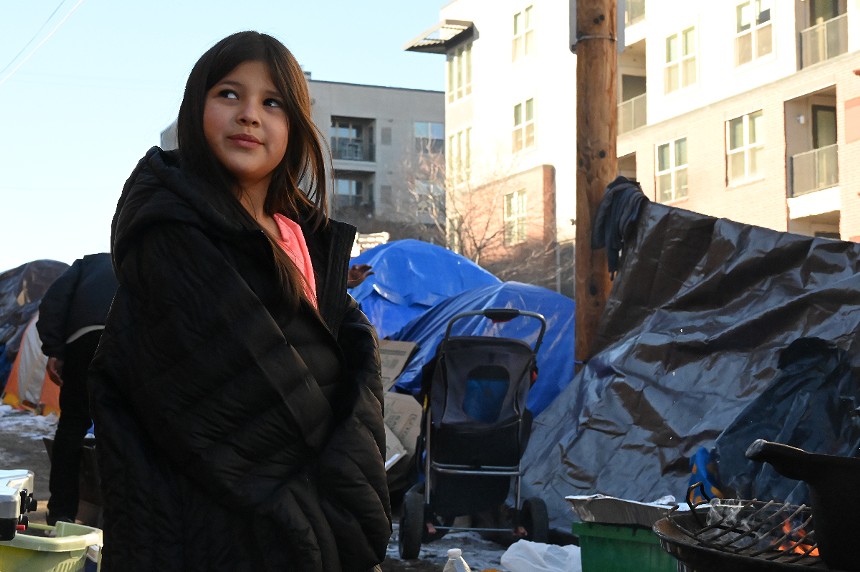
Eight-year-old Aranza Delgado stands by the tent where she lives with her mother, Kenia Chacon, who is waiting for the chance to work and get an apartment.
Bennito L. Kelty
Activists will try and push immigration issues to the front of the state's political caseload this weekend with a pilgrimage from Denver to Greeley that will pass in front of the offices of U.S. senators John Hickenlooper and Michael Bennet. The Colorado Immigrant Rights Coalition, which is organizing the demonstration, is calling for pathways to citizenship for the estimated 8.5 million undocumented immigrants in the United States. The pilgrimage will start on Friday, December 1, and end on Monday, December 4.
The Temporary Protected Status policy, which allowed Venezuelan migrants to work and remain in our country because theirs is in crisis, gave nearly half a million Venezuelan migrants in the U.S. a pathway to find work, including Hector Morales, who was hanging out a few tents up from Chacon's on Tuesday afternoon.
"I have TPS because I entered in February," Morales says. "I'm just in the immigration process [to be able to work and stay in the U.S. permanently]. The mayor says that that should come soon and that they're going to help us, God willing."
Despite having work as a landscaper and a room that he rents from a Denver family for $500 a month, Morales still returns to the tents outside the shelter where he once stayed because "these are my brothers, my friends. I want to see how they're doing, what they need, to talk. It's where I like to hang out." He returns mostly to talk politics and see if he can help bring anything other migrants need.
Chacon arrived in Denver in mid-October after trekking through Central America and Mexico. All she needs is permission from the government to work — employers can't hire her until she has a work permit — but in the meantime, she's become a part of the community that's formed among the Venezuelans and a few Colombians who live at the encampment.
"It's feels like a community," she says. "Communicating, for example, is very easy. Everybody understands what you've been through, and if you need anything, you can find it from anybody else here."
One way that Chacon has been able to connect with the other migrants in the Mile High City and outside the Quality Inn is through food. Using a black charcoal barbecue pit that someone at the encampment bought a while back, she and other migrants cook and share food that they eat in their home country.
"I cook for everyone here, whoever comes, as long as they share," Chacon says. "That's the way it is. If I get hungry, I can cook, and it's to serve to others too. Or I can go to someone else who's cooking, help them out. We're all taking care of each other here."
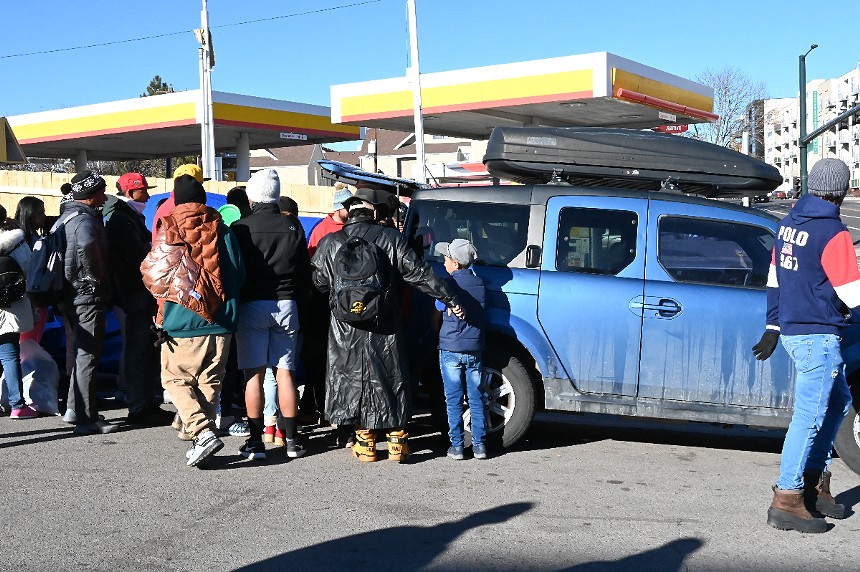
About a dozen migrants flock around a truck that stopped by the encampment at West 27th Avenue to hand out tacos.
Bennito L. Kelty
Many of the migrants staying at the encampment have children with them and have been able to enroll the youths in Denver Public Schools. Chacon tried to get her daughter into classes to start this week, likely at Valdez Elementary, but was told the school didn't have room for her.
Martinez has a daughter in second grade who started school at Valdez on Wednesday, November 29.
Bianca Bravo, another migrant at West 27th, arrived from Venezuela in October and has lived at the encampment for just a few days after leaving the Quality Inn. She has two children — a fifteen-year-old and a seventeen-year-old — who started classes at North High School on the same day, Wednesday, November 29.
People often stop by the encampment to drop off donations, like clothes, tents and sleeping bags. Throughout the day, migrants staying there will flock around car trunks and hatches to get food or other things being given away.
Martinez, Morales, Bermudez and Chacon all say that the people helping them are both American and Mexican families, but Martinez emphasizes that "a lot of Mexicans" are coming by to drop off donations. "The Mexicans are supportive here in the United States, and they're the ones who are trying to make us at home," he tells Westword.
"A lot of people come to bring a lot of stuff," Morales says. "But a lot of Mexicans. A lot of Americans, too, will hand off clothes. It's very beautiful, to tell the truth. I'm grateful. People come and leave food, clothes, medicine."
Despite their current situations, many migrants at the West 27th encampment feel like they've been able to make the best of it. "We're trapped here. None of us have money, we don't have work," Bravo says . "But we have a community here, I know the people here. The worse thing would be for someone to come and tell us to move, and I would have to start all over, find another school for my kids. Everything I have right now is here."

